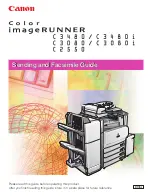
R76-/R76-2
OKIFAX 5700/5900
A3 - 23
A3.1.12 Electrophotographic Process
The electrophotographic processing is outlined below. The electrophotographic printing
process is shown in Figure 2-4.
1
Charging
The surface of the image drum is charged uniformly with a negative charge by applying
the negative voltage to the charge roller.
2
Exposure
Light emitted from the LED head irradiates the negatively charged surface of the image
drum. The surface potential of the irradiated portion of the image drum surface be-
comes lower, forming the electrostatic latent image associated with the print image.
3
Developing and toner recovery
When the negatively charged toner is brought into contact with the image drum, it is
attracted to the electrostatic latent image by static electricity, making the image visible.
At the same time, the residual toner on the image drum is attracted to the developing
roller by static electricity.
4
Transfer
When paper is placed over the image drum surface, the positive charge which is
opposite is polarity to that of the toner, is applied to the reverse side of the paper by
the transfer roller. The toner is attracted by the positive charge and is transferred onto
the paper. This results in the transfer of the toner image formed on the image drum
onto the paper.
5
Temporary cleaning
Residual toner which remains on the image drum without being transferred is evened
out by the cleaning roller and is temporarily attracted to the cleaning roller by static
electricity.
6
Fusing
The toner image transferred onto the paper is fused to the paper by heat and pressure.
An electrophotographic process timing chart is shown in Figure 2-5.
Summary of Contents for OKIFAX 5700
Page 6: ...CHAPTER 1 GENERAL INFORMATION ...
Page 90: ...CHAPTER 2 INSTALLATION PROCEDURE ...
Page 102: ...OKIFAX 5700 5900 2 12 3 Document stacker Hang the document stacker onto hanging position ...
Page 204: ...OKIFAX 5700 5900 2 114 Typical Transmission flow ...
Page 205: ...OKIFAX 5700 5900 2 115 Typical Reception flow ...
Page 210: ...CHAPTER 3 BRIEF TECHNICAL DESCRIPTION ...
Page 218: ...CHAPTER 4 MECHANICAL DISASSEMBLY AND REASSEMBLY ...
Page 223: ...OKIFAX 5700 5900 4 5 Appearance of the OKIFAX 5700 5900 ...
Page 248: ...CHAPTER 5 ADJUSTMENTS ...
Page 252: ...CHAPTER 6 CLEANING AND MAINTENANCE ...
Page 278: ...CHAPTER 7 TROUBLESHOOTING AND REPAIR FOR OKIFAX 5700 5900 ...
Page 390: ...C34 OKIFAX 5700 5900 A3 40 IC201 Pin Assignment ...
Page 405: ...Appendix B DescriptionsofPrintOperation ThirdEdition December 1998 Oki Data Corporation ...
Page 427: ...Appendix C Not used at this time ...
Page 430: ...OKIFAX 5700 5900 D 1 Section 1 CABINET ASSEMBLY ...
Page 432: ...OKIFAX 5700 5900 D 3 Section 2 CONTROL PANEL ASSEMBLY ...
Page 434: ...OKIFAX 5700 5900 D 5 Section 3 PRINTER ASSEMBLY 53 54 ...
Page 437: ...OKIFAX 5700 5900 D 8 Section 4 BASE ASSEMBLY ...
Page 439: ...OKIFAX 5700 5900 D 10 Section 5 FRAME ASSEMBLY SCANNER L ...
Page 441: ...OKIFAX 5700 5900 D 12 Section 6 FRAME ASSEMBLY SCANNER U ...
Page 443: ...OKIFAX 5700 5900 D 14 Section 7 CABLES OPTION BOARDS ...
Page 445: ...Appendix E Not used at this time Oki Data Corporation ...
Page 446: ...Appendix F Not used at this time Oki Data Corporation ...
Page 447: ...Appendix G PC Loading FirstEdition February 1999 Oki Data Corporation ...
Page 465: ...Appendix H RMCS SYSTEM MANUAL For Model 30 FirstEdition Oki Data Corporation ...
Page 466: ......






































